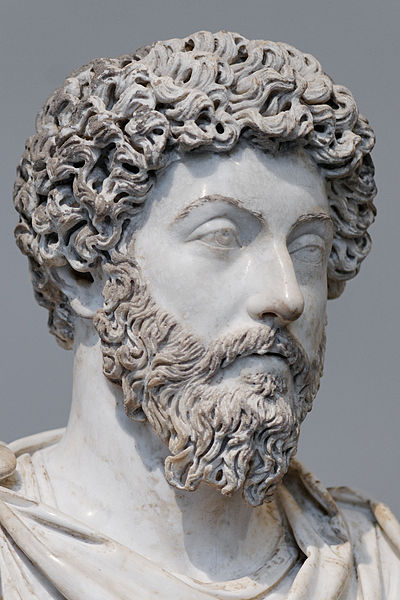Marcus Aurelius' Most Relevant Quotes for Modern Life
In this article, we're going to look at some of the greatest quotes from Marcus Aurelius that have been extremely helpful to me (and countless other people) to steadily improve, see things in a more relaxed way, and find more inner peace - and thus better cope with modern life.
In this article we will look at the meanings and how they relate to our world today.
Here you can jump to specific quotes if you want (otherwise just keep scrolling):
"What you receive, accept without pride! What you lose, give up without sorrow!"
„"Our life is what our thoughts make it."„
"It is useless to resent fate; for it accepts no complaints."
"Death smiles on all of us, the only thing you can do is smile back."
Now let's take a closer look at the originator of the quotes:
Who was Marcus Aurelius?
Marcus Aurelius (or Marcus Aurelius) lived in the 2nd century AD and was Roman Emperor from 161 to 180. He was also a philosopher and is considered the last influential Stoic of the younger era. His reign was marked by stability in the Roman Empire. He was also able to bring about improvements in social status for slaves and women.
Aurelius was born in 121 AD in Rome and died in 180 AD either in the west of today's Serbia (in what was then Sirmium) or in today's Austria near Vienna (then Vindobona). Unfortunately, his place of death is not completely clarified.
Since his youth, Aurelius was engaged in the teaching of philosophy and ultimately found the highest interest in Stoicism. Quintus Junius Rusticus is considered his most important Stoic teacher.
Even though Aurelius grew up very privileged, he definitely had to struggle with difficulties. Both politically and privately, he had to endure a lot. The Roman Empire was threatened by diseases and military threats from outside and during his life Marcus Aurelius and his wife Faustina lost several children.
The Stoic principles and other philosophical concepts were obviously instrumental in the Roman emperor's mastery of these situations. And thus it is fortunate that some of his works - first and foremost his work "The Self-Reflections" - have survived the test of time.

"What you receive, accept without pride! What you lose, give up without sorrow!"
Marcus Aurelius
In summary, the quote can be understood as an admonition to react moderately to what has been received and lost, since grief and pride keep one from living a full life.
Especially the feeling of pride in what you have received sets the stage for particularly strong feelings of loss as soon as you lose it later in life. This is not only a hindrance to a relaxed life, but can also lead to real problems if you cannot accept certain circumstances.
If you are interested in this topic, you can find here the complete Articles for you. We'll take a closer look at why Aurelius gave us this admonition and how you can work towards this goal.
"According to the nature of the objects which you most often imagine, your mind will also be directed; for from thoughts the soul takes its color."
Marcus Aurelius
The Roman philosopher Marcus Aurelius explains that one's own thinking leads to a conditioning of one's own perception. If you think negatively, you will tend to think negatively more and more often and also feel that way about your life.
To break out of this circle, you must begin to actively look at negative thoughts differently and formulate them in a positive way. Only in this way, a change in your thought patterns can be achieved.
A prominent example of Marcus Aurelius, is a surviving statement in which he affirmed that it was not best to pray for not losing one's children, but for how to deal with it.
In the article about this quote you will learn more about the background of these words as well as various examples for today.
„"Our life is what our thoughts make it."„
Marcus Aurelius
This quotation indicates that our thinking significantly determines the course of our life. According to Aurelius, this would have to do on the one hand with our own perception, which is shaped by thoughts, but also with the tendency that thinking results in corresponding actions.
I have an article for you that goes into more detail about this issue and the exact reasons most are unaware of it.
"It is useless to resent fate; for it accepts no complaints."
Marcus Aurelius
In this quote Marcus Aurelius says that there are things we cannot influence and that it is therefore pointless to rack our brains over them or even to be angry. For a fulfilled and satisfied life, acceptance is needed.
Unfortunately, we humans often have a tendency to get upset about things that are beyond our control - even though we know this, we do it anyway.
Does this sound familiar? If so, you're like most people. But you can get rid of this waste of your time and energy.
Want to see examples? I have a Articles for you to this quote where you learn how to protect yourself from this behavior.
„If you knew the source from which human opinions and interests flow, you would stop striving for people's applause and praise.„
Marcus Aurelius
In his teachings, Aurlius repeatedly addresses the fact that most people are driven by base motives and that we should therefore ideally make ourselves independent of them.
In this quote, it is clear that Marcus Aurelius is convinced that applause and praise are insignificant.
If you want to know what you have to gain by discarding this pursuit, here is my complete article.
"Death smiles on all of us, the only thing you can do is smile back."
Marcus Aurelius
Death is a subject that is rarely, much less willingly, dealt with in modern Western culture. In Stoicism and many other philosophies, however, it is omnipresent and conscious. And that is actually something good, because it holds the potential to let us live more intensely.
This is exactly what Marcus Aurelius was talking about in this quote.
If the thought of death makes you uncomfortable, or you just want to learn more about this article, go here to my Articles on this topic.
These were the most incisive quotes of the Roman emperor and philosopher, from which we can still benefit immensely today.
If you are interested in Aurelius' philosophy, you can find several books of his teachings. The most famous one is probably the "Self-Reflections", which you can order online without any problems (e.g. here at books.com).
There's also a good version on Audible that I listen to every now and then.
Did you like this article? You can let us inform you about new articles:







